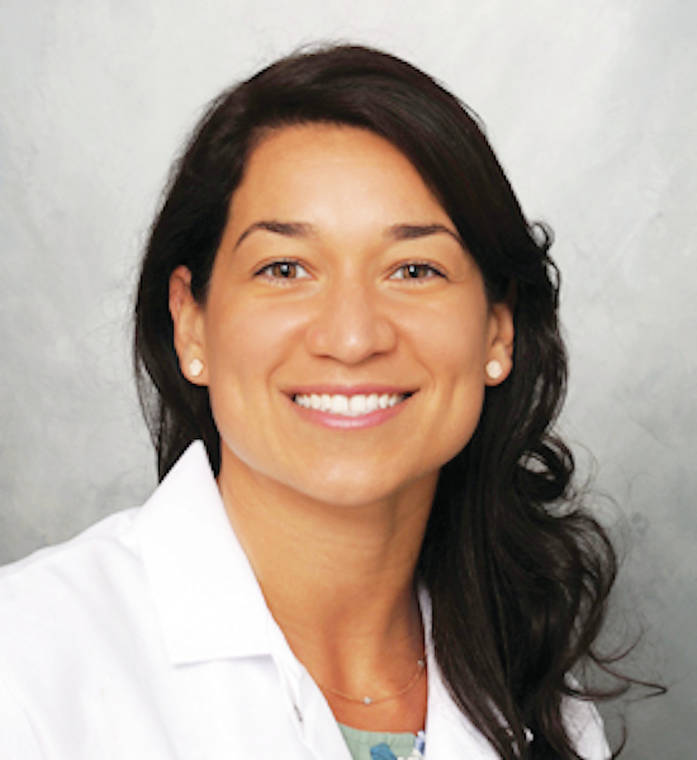LIHU‘E — The National Breast Cancer Foundation said that one in eight women in the United States will develop breast cancer in her lifetime.
In 2020, according to NBCF an estimated 276,480 new cases of invasive breast cancer will be diagnosed in women in the U.S. as well as 48,530 new cases of non-invasive (in situ) breast cancer.
Marisa Tabalno, an acute care nurse practitioner with a background in Surgery and Emergency Medicine at Wilcox Hospital and Kauai Medical Center said the practice she participates in is a general oncology practice but there is an abundance of patients.
“I see patients daily with a diagnosis of breast cancer both acutely diagnosed, currently undergoing active treatment regimens and in follow-up for surveillance and survivorship.”
Tabalno said she sees both women and men, though it’s much rarer in men with breast cancer.
According to NBCF, in 2020, an estimated 2,620 men will be diagnosed with breast cancer this year in the U.S. and approximately 520 will pass away.
Nurse practitioner Marisa Tabalno advises people to be aware of their bodies.
“Be in touch with your own body and don’t be afraid to report abnormalities as soon as you notice them,” Tabalno said. “Though we don’t have a way to prevent malignancies, breast cancer early recognition and prevention has saved countless lives over the past 10-15 years.”
Tabalno said all women older than 40 should have an annual mammogram organized by their primary care physician (PCP). If there is a strong family history of breast cancer in a first-degree relative (mother or grandmother, sister, etc), most insurance will cover the first mammogram at the age of 35.
“Regardless of your age, if you feel a lump, bump, asymmetry, tethering, nipple discharge, anything out of your ordinary, please seek medical attention from your PCP.
Early detection
The best way to detect breast cancer is by having early mammogram examinations.
“Starting at age 35 or 40, if first degree relative with a history of breast cancer,” Tabalno said. “Mammograms should be annual and a yearly breast exam either by their primary care provider or gynecologist.”
According to Tabalno, there are different types of breast cancers, treatment regimens, surgical options, etc.
“The first is, you are not alone,” Tabalno said. “Breast cancer is the second most common cancer found in women in the United States (second to skin cancers).”
Tabalno said the American Cancer Society estimates that there are currently 3.5 million survivors in the U.S.
“As science and research have continued to improve, we have made leaps and bounds regarding preventative strategies and treatment options for breast cancer over the past 10-15 years,” Tabalno said.
What to expect
Tabalno said if you are diagnosed with breast cancer you should expect to be seen by both a medical oncologist and very likely a surgeon. If surgery is necessary, which in nearly all curable cases it is, there are different options including lumpectomy (removal of the cancer part of the breast) or mastectomy (complete removal of breast tissue).
“However, each case is very different, so I would most definitely listen to the options presented by your Oncologist and surgical team,” Tabalno said. “If a mastectomy is recommended, I’d like to remind women that there are many reconstructive options available which allow for excellent cosmesis and ultimately, continuing to feel like a woman.
“In fact, I worked closely with a breast reconstructive surgeon when I worked on Oahu and the results are just astounding,” said Tabalno.
Support teams can make the difference when starting your new health journey.
Tabalno said, there are also many support groups out there for those with breast cancer to help cope, speak with other women who are or who have experienced a similar situation.
“Despite COVID-19, many of them are meeting virtual to continue to support one another,”Tabalno said. “I think each patient and cancer diagnosis is an individual story and often needs to be heard as it helps with the overall grieving process associated with having breast cancer in general.”
The way to adapt and overcome any new challenge is to have a positive mindset.
“As I have told my patients throughout my career within emergency medicine, surgery and now medical oncology, regardless of the situation presented in life, you must adapt and overcome,” Tabalno said. “You need to stay positive and consistently have a half glass full mentality as your mental status significantly impacts your physical being; like the old saying goes ‘mind over matter’ — this is a real entity and I find that those patients who can see the positive within a challenging situation, rise above.
“I also think that having a community is a necessity; it truly does take a village to overcome obstacles. If you can seek support from your church, extended family, or as I would, your gym Ohana, patients are often overwhelmingly surprised by the outpouring of support,” said Tabalno.
While new data is surfacing on a daily, Tabalno explains her final thoughts on maintaining a healthy lifestyle. Something she knows well, as the co-owner of Kaua‘i CrossFit on Lihu‘e, with her husband Adam Tabalno.
“Inclusive of vigorous exercise 4-5 days a week, eat a diet inclusive of less processed, whole foods, little sugar, whole grains, and vegetables,” Tabalno said. “If you can refrain from any tobacco use as this is linked to many types of malignancies, that would be increasingly beneficial.”


